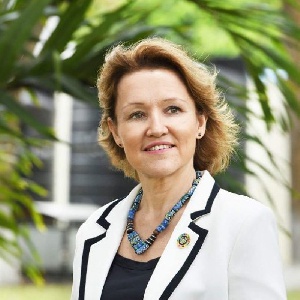 Madam Anne-Claire Dufay, UNICEF Representative in Ghana
Madam Anne-Claire Dufay, UNICEF Representative in Ghana
The United Nations Children's Fund (UNICEF) in collaboration with the Government of Ghana and MasterCard Foundation has launched the COVID-19 Education Recovery and Resilience Programme.
The virtual launch was addressed by Madam Anne-Claire Dufay, UNICEF Representative in Ghana; Madam Nathalie Akon Gabala, Mastercard Foundation’s Regional Head for Western, Central and Northern Africa, and Professor Kwasi Opoku-Amankwa, Director-General of Ghana Education Service.
This initiative is supporting efforts of the Ministry of Education and the Ghana Education Service to ensure that children had access to quality continuous education opportunities through the radio, while they were at home due to school closures.
The programme will also support back to school efforts to ensure that all children, and especially girls, returned to a safe environment to learn and remedial/differentiated teaching and learning to enable learners to catch up once they returned to school.
As part of the initiative, the two-year programme, which commenced in June 2020 and runs until May 2022, supported the implementation of virtual and distance learning through radio, SMS, and online learning platforms which will be made available to children across the country.
Learners are being provided with access to online platforms to engage with GES-approved coursework and materials and screen time with tutors.
To ensure equitable access to all, children in remote locations or without access to smart devices will benefit from lessons via community radio stations and SMS.
In collaboration with identified media organizations in the country, the partnership also provides the multiple broadcast of courses to learners via TV channels with nationwide coverage.
The programme includes the development of complementary materials to ensure the protection of vulnerable learners during school closures and when schools re-open in early 2021.
Madam Anne-Claire Dufay, UNICEF Representative in Ghana, said COVID-19 was re-defining “education” across the globe and propelling, all, to stretch beyond the traditional definition of a classroom or a school and to look for innovative ways of reaching children and youth with opportunity for continued learning in this very unusual time.
“UNICEF congratulates Government of Ghana for its swift and decisive response to the COVID-19 outbreak in the country, including; the development and implementation of the Coordinated Education Response Plan, and the phased and partial reopening of schools," she said.
Madam Dufay noted that the three major objectives of the programme were; to strengthen remote and distance learning in the short –term; to prepare schools to re-open and ensure learners re-enter schools in the medium-term; and to strengthen the resilience of the sector in the long-term.
She said through the COVID-19 Recovery and Resilience Programme, UNICEF seeks to work with the Mastercard Foundation and the Ministry of Education and the Ghana Education Service to augment the efforts already undertaken to support continuous learning for every child and young person.
Madam Nathalie Akon Gabala, Mastercard Foundation’s Regional Head for Western, Central and Northern Africa, said the pandemic had a multi-faceted impact on education, but those who had borne the brunt of its adverse effects were children from vulnerable households and girls.
She noted that to ensure that the pandemic does not exacerbate existing inequalities, this programme was designed to enable learning in the short-, medium-, and long-term—including preparing for potential future crises.
“Even when schools re-open, we will need to pay special attention to the needs of children who may have fallen further back than their peers and those who are likely not to return”, she added.
Professor Kwasi Opoku-Amankwa, Director-General of Ghana Education Service, noted that the Service was aware of the negative impact of COVID-19 on learners, especially for the vulnerable ones.
He reiterated that an important lesson the pandemic had taught all stakeholders was the need to adopt measures that would enable children to learn at home through remote and distance learning service delivery models during crisis.
Prof Opoku-Amankwa also highlighted the need to work together to ensure a quick recovery of the education sector in a manner that guaranteed the safety of all learners and staff.
The Director-General, who said the Service was working on building a system that would be resilient enough to withstand future shocks and that allows for continuous learning for all children always, adding that "any support in this direction, such as the one coming from this partnership, is well appreciated.”